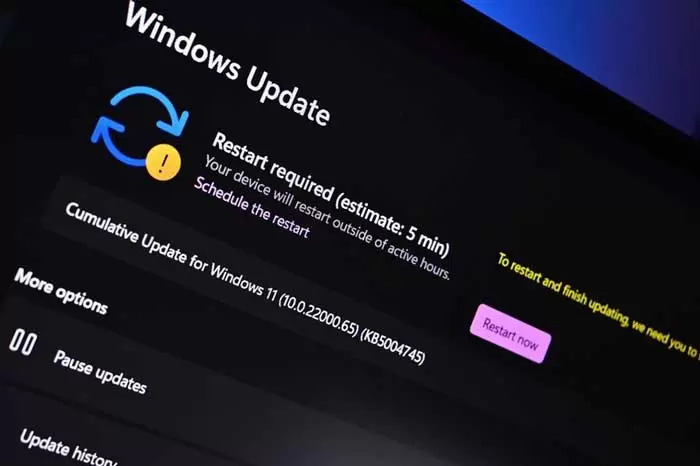4 Ways to Stop Windows 11 Update (and Prevent Internet Usage)
By default, Microsoft automatically downloads and installs Windows 11 updates for you. This article describes four ways to prevent this from happening. Stay with us!
With the introduction of Windows 11, Microsoft made significant changes to the well-known Windows functionality. However, a key part of Windows 10 remained strong, and that is the approach of Windows 10 towards updates.
By default, Windows 11 continues to download and install various updates automatically. You may not notice this until you turn off your device because you need to restart the computer to perform further updates.
However, you may prefer more control over which updates are installed on your PC and when they are downloaded. Whether you want to stop updates for a short time or permanently, there are four ways to disable automatic updates in Windows 11.
The first method: from the settings section
This method is almost the simplest, but at the same time, it is also the most restrictive. If you’re currently bombarded with updates but don’t want to configure them all the time manually, it’s worth a try:
1-Open Settings.
2- Select Windows Update from the left side. This option is usually at the end of the list.
3- In the “More Updates” section, you will find an option to stop the updates. Click the “Pause for one-week” button. After that, the automatic updates will continue again.

However, this setting disables updates for seven days or until you enable them. Unlike the other methods described in this article, there is no option to continue setting them up manually.
The second method: through Windows services
If you’re looking for something that will save you from updates for a longer time, Windows Services is another option:
1- Press the Windows key + R to open the Run window.
2- Type “services. MSC” in the box and press Enter.
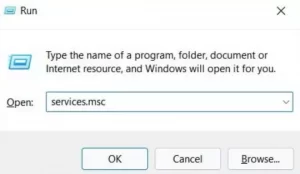
3- In Services (Local), scroll down the list to find Windows Update and double-click it.
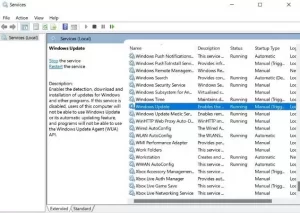
4- Under the “General” tab in the Properties window that opens, click on the drop-down menu next to “Startup type” and select “Disabled.”
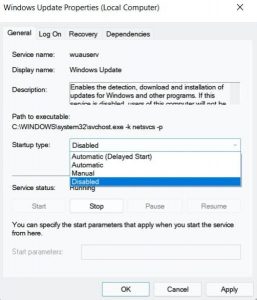
5- Click “Apply” and “OK” to save the changes.
Automatic updates will now be disabled, but you can still enable them manually through Settings. Repeat the process and select “Manual” or “Automatic” if you want to enable them again.
Third method: Set the Internet connection to Metered connection
A metered connection is an internet connection that limits the amount of data you can use. As you’d expect, setting up a restricted connection in Windows 11 means that updates aren’t automatically downloaded in the background. How to do this setting is as follows:
1- Open Settings and select “Network & Internet” from the left window.
2- At the top of the screen, click on “Properties” next to the network you are using.
3- Click on the button next to “Metered connection” to turn it on.
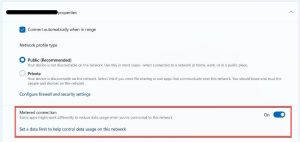
4- After this, click on “Windows Update” from the left and “Advanced options.”
5- In the next step, in the section called “Download updates over metered connections,” click on the key to turn it on.
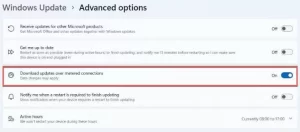
You should not have any problems when working with Windows without setting a limit for the metered connection. Of course, other background activities that depend on the Internet may also be disabled.
The fourth method: editing the registry
The fourth and last method involves making changes in the registry. As such, it is important to proceed with caution and follow these steps carefully:
1- Press the Windows key + R to open the Run window.
2- Type “regedit.exe” in the box and press Enter.
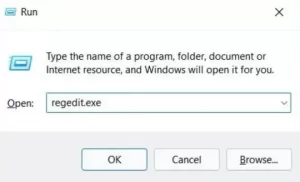
3- From the pop-up window that appears, click “Yes” to confirm that you allow the changes to be made.
4- Right above all folders, you will find an address bar. Delete anything you see and replace it with “HKEY_LOCAL_MACHINE\SOFTWARE\Policies\Microsoft\Windows\WindowsUpdate\AU” before hitting Enter again.
5- Right-click on any space in the right half of the page and select New > DWORD (32-bit) Value.
6- Name it NoAutoUpdate and press Enter.
7- Double click on this new value and set its “Value data” to 1.
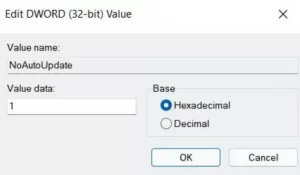
8- Click “OK” to confirm, then restart your device to apply the changes.
As you can see, many options exist to disable automatic updates in Windows 11. All of them are reversible, meaning you can easily reactivate them if the manual update process expires.
